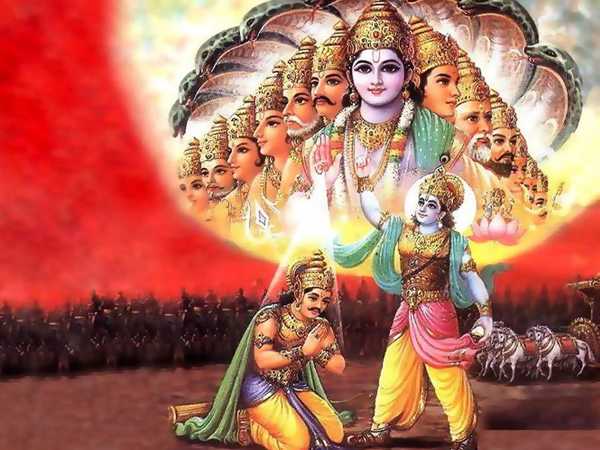Chapter 18

“–The Brahmana said, ‘The acts, good and bad, that a Jiva does are notsubject to destruction. Upon attainment of body after body, those actsproduce fruits corresponding with them.[16] As a fruit-bearing tree, whenthe season comes of productivity, yields a large quantity of fruit,similarly merit, achieved with a pure heart, yields a large crop (offelicity). After the same fashion, sin, done with a sinful heart,produces a large crop of misery. The Soul (or Jiva), placing the mindahead, addresses himself to action. Hear then how Jiva, equipt with allhis acts and overwhelmed with lust and wrath, enters the womb. The vitalseed, mixed with blood, enters the womb of females and becomes the field(of Jiva), good or bad, born of (his) acts. In consequence of hissubtlety and the condition of being unmanifest, Jiva does not becomeattached to anything even after attaining to a body. Therefore, he iscalled Eternal Brahman.[17] That (viz., Jiva or Brahman) is the seed ofall creatures. It is in consequence of Him that living creatures live.That Jiva, entering all the limbs of the foetus part by part, acceptingthe attribute of mind, and residing within all the regions that belong toPrana, supports (life). In consequence of this, the foetus becomingendued with mind begins to move its limbs.[18] As liquified iron, poured(into a mould), takes the form of the mould, know that the entrance ofJiva into the foetus is even such. As fire, entering a mass of iron,heats it greatly, do thou know that the manifestation of Jiva in thefoetus is such. As a lamp, burning in a room, discovers (all thingswithin it), after the same manner mind discovers the different limbs ofthe body.[19] Whatever acts, good or bad, Jiva does in a former body,have certainly to be enjoyed or endured by him. By such enjoyment andendurance former acts are exhausted, and other acts, again, accumulate,till Jiva succeed in acquiring a knowledge of the duties included in thatcontemplation which leads to Emancipation. Regarding this, I shall tellthee those acts by which Jiva, O best of men, while coursing through arepeated round of re-births, becomes happy, Gifts, observances ofausterity, Brahmacharyya, bearing Brahman according to the ordinanceslaid down, self-restraint, tranquillity, compassion for all creatures,restraint of passions, abstentions from cruelty as also fromappropriating what belongs to others, refraining from doing even mentallyall acts that are false and injurious to living creatures on the Earth,reverently serving mother and father, honouring deities and guests,worship of preceptors, pity, purity, constant restraint of all organs,and causing of all good acts, are said to constitute the conduct of thegood. From observance of such conduct, arises Righteousness whichprotects all creatures eternally. Such conduct one would always beholdamong persons that are good. Verily, such conduct resides thereeternally. That course of practices to which persons of tranquil soulsadhere indicates Righteousness. Among them is thrown that course ofpractices which constitutes eternal Righteousness. He who would betakehimself to that Righteousness would never have to attain to a miserableend. It is by the conduct of the good that the world is restrained in thepaths of Righteousness when it falls away. He that is a Yogin isEmancipated, and is, therefore, distinguished above these (viz., thegood).[20] Deliverance from the world takes place, after a long time, ofone who acts righteously and well on every occasion as he should. Aliving creature thus always meets with the acts done by him in a formerlife. All these acts constitute the cause in consequence of which hecomes into this world in a state different from his true form.[21] Thereis a doubt in the world as regards the question. By what was theacceptance (by Jiva) of a body first determined. The Grandsire of all theworlds, viz., Brahma having first formed a body of his own, then createdthe three worlds, in their entirety, of mobile and immobile creatures.Having first himself assumed a body, he then created Pradhana. ThatPradhana is the material cause of all embodied creatures, by whom is allthis covered and whom all came to know as the highest. This that is seenis said to be destructible; while the other is immortal andindestructible. This that (is seen) is said to be Kshara (thedestructible); that, however, which is Para (the other) is the Immortal,(as also) Akshara (the Indestructible). Of each Purusha takendistributively, the whole is duality among these three.[22] Seen first(to appear in an embodied form) Prajapati (then) created all the primalelements and all immobile creatures. Even this is the ancient audition.Of that (acceptance of body), the Grandsire ordained a limit in respectof time, and migrations among diverse creatures and return or rebirth.All that I say is proper and correct, like to what a person who is enduedwith intelligence and who has seen his soul, would say on this topic ofprevious births.[23] That person who looks upon pleasure and pain asinconstant, which, indeed, is the correct view, who regards the body asan unholy conglomeration, and destruction as ordained in action, and whoremembers that what little of pleasure there is, is really all pain, willsucceed in crossing this terrible ocean of worldly migration that is sodifficult to cross. Though assailed by decrepitude and death and disease,he that understands Pradhana beholds with all equal eye thatConsciousness which dwells in all beings endued with consciousness.Seeking the supreme seat, he then becomes utterly indifferent to all(other) things. O best of men, I shall now impart instruction to thee,agreeably to truth, concerning this. Do thou, O learned Brahmana,understand in completeness that which constitutes the excellentknowledge, as I declare it, of that indestructible seat.–‘”




